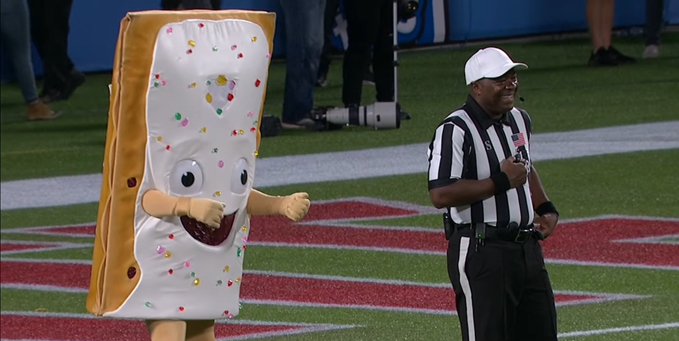


Mitch’s Blog
The Pop Tart Screen Play
Friday, December 29, 2023
This line of thought started with the morning sports show talking about the Pop Tarts Bowl, held yesterday in (appropriately) Orlando, Florida. The payout to the two teams was somewhat north of $6 million. Congrats, Kansas State! The morning show had massive linemen popping tarts into their mouths. I assume the same was true under the bowl’s previous name, the Cheez-It Bowl.
Back in the day, your only sponsors were various flowers, fruits, or sugar, without C&H moniker attached to the name. OK, I do understand how these sponsorships help colleges: half of $6 million can fund a lot of adjunct professors… if the money goes there and not to the football coach salary. And corporate sponsorships can have their humorous elements. Who can take a football game seriously that is called the Famous Idaho Potato Bowl (Boise, Dec. 23) or the Duke’s Mayo Bowl (Charlotte, Dec. 27)? Do they play with potato instead of footballs or coat the grass with a thin stratum of mayo before the game? I would definitely watch one of those bowl games! At least you can guarantee that the Yankee Stadium lawn will be mowed prior to the Bad Boy Mowers Pinstripe Bowl (Bronx, Dec. 28).
 Tony the Tiger, Taxslayer (collegiate tax slayers?), Wasabi (a hot one), Union Home Mortgage (for the homes students can’t afford to buy), and Scooter’s Coffee have their own bowls now out of the 44 games listed. The amount going to the schools and the conferences they belong to ranges from 6 to 8 figures. No wonder there is such a battle over who has voting rights in the dissolution of the Pacific 12 Conference this year. But that assumes that the costs to these colleges are below these sums. Apparently, a lot of colleges lose money on participating in bowl games, sometimes losing millions, because they are forced to guarantee a minimum number of ticket sales, pay for the travel and housing costs for the team, preparing slick marketing spots for the tv broadcasts, etc.
Tony the Tiger, Taxslayer (collegiate tax slayers?), Wasabi (a hot one), Union Home Mortgage (for the homes students can’t afford to buy), and Scooter’s Coffee have their own bowls now out of the 44 games listed. The amount going to the schools and the conferences they belong to ranges from 6 to 8 figures. No wonder there is such a battle over who has voting rights in the dissolution of the Pacific 12 Conference this year. But that assumes that the costs to these colleges are below these sums. Apparently, a lot of colleges lose money on participating in bowl games, sometimes losing millions, because they are forced to guarantee a minimum number of ticket sales, pay for the travel and housing costs for the team, preparing slick marketing spots for the tv broadcasts, etc.
There is little question of the importance of collegiate sports to young athletes. The training, the discipline, the leadership, the teamwork learned in these programs do wonderful things for many. Some from underserved communities would never have the opportunity to go to a college without the scholarships afforded by their athletic expertise. I haven’t seen Boys in the Boat yet, but I’m sure this theme runs throughout the movie. Unfortunately, like many elements of modern American culture, college sports like basketball and football have been swallowed up by good old fashioned commercial greed. Of fifteen University of Kentucky players drafted into the NBA, only two of them had more than a single year of college before the draft. Those two played two years. This includes folks like Anthony Davis, Devon Booker, and De’Aaron Fox, who make insane salaries showing off their prodigious athletic skills. Can Kentucky’s basketball program be considered anything other than pre-professional training? It’s certainly not an educational program; the students don’t even have time to learn the names of the tutors the university provides them.
Northwestern’s football coach Pat Fitzgerald is suing the university for $68 million left on his contract when he was fired after an unsuccessful season. His doesn’t even make the list of the top 30 of college football coach salaries. His payout would have funded an entire army of anthropology adjuncts and probably a few historians as well. The top 30 coach salaries combined could probably fund an entire community college for a year or two.
And then there are the endless stories of abuse of athletes by coaches, trainers, boosters, doctors, and others associated with sports programs. One of these swept up a close friend, Graham Spanier, President of Penn State University, who was sent to jail for not asking enough questions about what was going on in the locker room.
The collapse of the Pacific 12 and scattering of its teams like cockroaches to other conferences who will pay them more highlights the extent of this problem. Having Cal and Stanford in the ATLANTIC Coast Conference is nothing short of absurd. Or the forced renaming the Big Ten/Twelve/Twenty-Six Conference to accommodate the expanding number of member schools. This alone highlights how this system no longer has anything to do with colleges and everything to do with money. Time to wipe out the system and begin anew.

Let’s force the other major sports do the same. Each can afford to set up and support their own minor league system to train future players. The Las Vegas Raiders AAA team can play in the cavernous but now vacant Oakland Coliseum. And these teams should pay for all the training, medical bills, hotel costs, and salaries for these minor league players anxious to make it to the Big Sack. The same for basketball.
The system is preserved because of the threat of big donors stopping their flow of money to campuses if there were no football games to attend on Saturday. But the data on this is, at best, mixed, and doesn’t reflect the amount of booster giving that goes directly back to sports programs rather than to the overall institution.
And then maybe colleges can get back to their jobs, one of which is to educate students to understand how advanced capitalism has destroyed, warped, and twisted so many of our institutions.
(c) Scholarly Roadside Service
Back to Scholarly Roadkill Blog
Scholarly Roadside Service
ABOUT
Who We Are
What We Do
SERVICES
Help Getting Your Book Published
Help Getting Published in Journals
Help with Your Academic Writing
Help Scholarly Organizations Who Publish
Help Your Professional Development Through Workshops
Help Academic Organizations with Program Development
CLIENTS
List of Clients
What They Say About Us
RESOURCES
Online Help
Important Links
Fun Stuff About Academic Life


